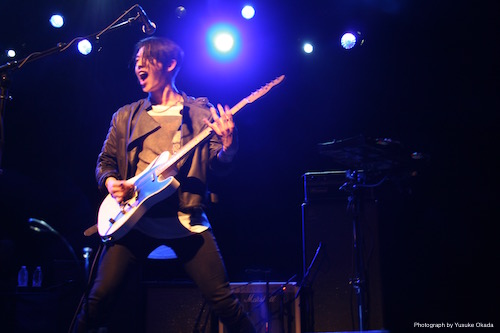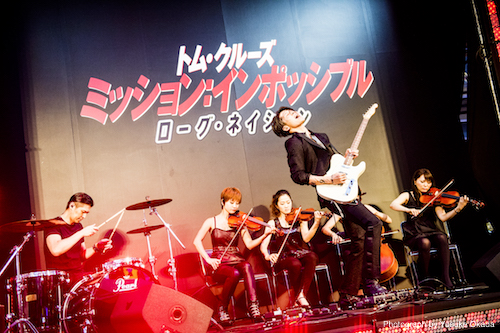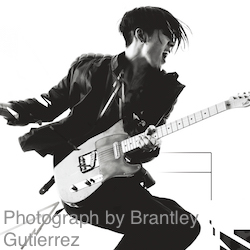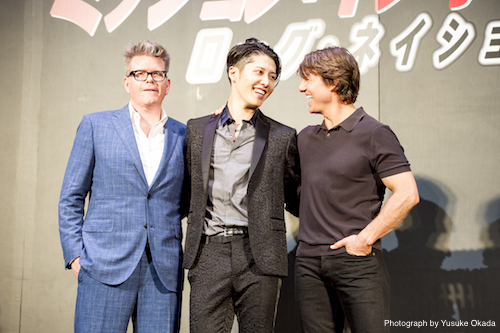Making Music and Movie Magic
MIYAVI is making waves on both sides of the ocean in the music and movie industries. Born in 1981as Takamasa Ishihara in Osaka, Japan to a Korean father and a Japanese mother, the singer, songwriter, guitarist, record producer and actor took on the stage name MIYAVI. Known for his unconventional style of slapping the guitar rather than playing it with a pick, his international fan base has nicknamed him the Samurai Guitarist. He has four world tours under his belt with over 200 shows in 30 countries across North and South America, Asia and Australia. He has collaborated with X Japan’s Yoshiki and SUGIZO in the supergroup S.K.I.N., Boøwy’s Tomoyasu Hotei, Pizzicatto Five’s Maki Nomiya and Good Charlotte. In 2014, MIYAVI debuted as a Hollywood actor in Angelina Jolie’s Unbroken, playing the notorious and sadistic World War II internment camp guard Mutsuhiro “The Bird” Watanabe, the chief tormentor of American Olympian and POW Louis Zamperini. MIYAVI shows no signs of slowing down in 2015 with the release of his new album in April, The Others, and a world tour to Hong Kong, Thailand, the U.K., France, Germany, Italy, Hungary, Poland, Russia and Finland. He has also successfully combined movies and music by reworking the classic theme song for Mission: Impossible – Rogue Nation, the fifth installment in the Tom Cruise-starring series. Tokyo Journal’s Executive Editor Anthony Al-Jamie talked to MIYAVI about his multifaceted career.
TJ: Were you apprehensive about accepting the role of Mutsuhiro “The Bird” Watanabe in Unbroken?
MIYAVI: Actually, I was not sure if I was capable. I had no experience. The Japanese casting director came to our office and told me about the project. She asked me a couple of questions such as what kind of music I play, types of films I like and who my favorite actor is. I answered, “Angelina Jolie.” That was the best answer and I got cast (laughs). I heard Angie found me on the Internet, contacted the Japanese casting director and came.
TJ: What did you enjoy the most about filming the movie?
MIYAVI: The experience of working with professional people like Roger Deakins, the casting director and the AD (assistant director). One day I asked the AD, who was taking care of me, “Who have you been working with?” He said, “I’ve worked with Leonardo DiCaprio on The Great Gatsby, and after that Hugh Jackman for Wolverine and then you.” I thought, “Oh! Not bad…” (laughs). I learned many things from the experience.

TJ: How do you feel about Unbroken not being released in Japan?
MIYAVI: People don’t hate Germany after watching Schindler’s List. So if you’re confident that you can overcome that negative side of your history, I think you can accept it. I think Japan is still dealing with those political issues, so it’s really complicated. I understand. I’m totally fine. I did what I believe in and it’s meaningful.
TJ: What are your thoughts on war?
MIYAVI: I don’t say who is right or who is wrong. Everyone is a victim and a loser, especially young children or women who don’t have power. I understand that sometimes people have to fight to protect their family or friends... but those kinds of conflicts in the world actually result in nothing. That’s why I play the guitar. I cannot do anything with a guitar in a battlefield while people are fighting with guns, but I believe that with a guitar I can do something to prevent those kinds of conflicts before war happens. Japan is still having conflicts with its neighboring countries, but I have fans in China and Korea, so we are connected. That’s why I strongly believe in the power of music. Once you start dancing together, you just have fun. It doesn’t matter where you’re born or what kind of language you speak.
TJ: Have you thought about combining your musical career with some kind of world peace campaign?
MIYAVI: Well, I just took a trip to Lebanon. Angie [Angelina Jolie] is a special envoy of UNHCR [the United Nations High Commissioner for Refugees], which is taking care of refugees — people who have been displaced from their own country. Before I went to a refugee camp, I was not sure if I was capable of doing something for them, but with a guitar I was able to have a great time with the children. They started dancing and singing. I’m not as famous as Angie or other stars, but at refugee camps it doesn’t matter. They are so pure and once the music starts, they just go with the flow and have fun. I realized the power of music.
TJ: How did you get started in your musical career?
MIYAVI: Actually, I had no dream [to be a musician] when I was a kid. I was on a junior high school soccer team, but I got injured and I had to give up my dream to be a professional soccer player. I had no hope. I started playing guitar with my friends and I don’t know why, but when I touched the guitar for the first time, I was really confident. I could picture myself playing in front of a huge crowd on stage under the spotlight. Music saved me.
TJ: How old were you then?
MIYAVI: 15. I was so depressed. I was struggling.
TJ: And how did you get into a band?
MIYAVI: I was in a band in my hometown in Osaka. My friend taught me what music is. He introduced me to a lot of good music like The Police, Prince, Michael Jackson, Elvis Presley, even Bauhaus, David Bowie and Nirvana. He was two years older than me and was like my brother. But he passed away when I was 17. When he passed away, I didn’t want to stay in my hometown because even if the scenery and people were the same, and I was just hanging out with my friends doing normal things, I felt totally different. I was really, really sad. I couldn’t accept the fact that he was gone. That was my first time losing somebody; even my grandparents were still alive. I went to Tokyo – I just wanted to get out. And then my career started . . . just going to clubs, doing a little modeling, playing the guitar, making friends and getting into the industry.

TJ: How did you get the name MIYAVI?
MIYAVI: It’s from my first name. My first name is Takamasa. As you know, Japanese names are created with Chinese characters [kanji]. One of the kanji in my first name is Miyabi and I really like that sound.
TJ: Why did you spell it with a “V”?
MIYAVI: With a “V” there are no curves in the letters. My fans in Europe started calling me “the Samurai Guitarist,” so I thought writing my name without any curved lines would be cool. It’s more intense.
TJ: Why did they start to call you the Samurai Guitarist?
MIYAVI: I don’t know. I want to ask my fans! The samurai is a really symbolic character. I’m a solo artist. I use the guitar instead of a katana [sword], so I think that’s why my fans started calling me that. Actually, I’m fine with anything my fans call me.
TJ: How did you develop your guitar-slapping style?
MIYAVI: There are tons of great guitarists. I just wanted to have a reason as to why an Asian guy plays the guitar, and have people recognize a distinctive sound.
TJ: It was interesting to see how few Japanese there were in the audience at your L.A. performance.
MIYAVI: Yeah, I love it. Even in Japan many people from outside Japan come to my show, so I really feel like I’m making music not only for my career, but also to make a kind of bridge so people can get to know each other. My fans in Japan try to come to the States or Europe and then they make friends in those countries. With music, we can go beyond cultural differences and language barriers.
TJ: Why did you perform in L.A. as a two-man act?
MIYAVI: Low budget! It’s pretty tough to tour around the world as a Japanese musician. It costs a lot. If the event is huge, it’s fine. But if it’s not, it’s impossible. I have a fanbase that has been waiting for me for a long time, so that’s why I wanted to make it happen. Thanks to my drummer, Bobo, it was possible.
TJ: Do you prefer writing lyrics in Japanese or English?
MIYAVI: When I sing in Japanese, it’s easier to deliver my emotion and message, but it’s impossible to express things to people who don’t understand Japanese. So learning English and singing in English was the first step for me to deliver my message. Eventually, people would get interested in Japanese culture and language. My fans all over the world sing in Japanese now. I’m so proud of them, and I feel so lucky when the audience is singing along in Japanese. But I have to keep singing in English for a while. The more I am able to sing in English well, the more Japanese lyrics I can sing in the future.
TJ: Where did you get your independent thinking?
MIYAVI: I was born and raised in Japan and I’m touring, rocking the crowd as a Japanese, but I feel my Korean side. Korean people are more aggressive; Japanese people are more passive. I think this is because of the land, tradition, food and weather. Japanese people live on an island where there is less danger of being attacked by other people. But in Korea, you’ve got so many different locations to protect, so I think personalities are different. Although Japanese pickles are very salty, they don’t have a strong taste; they are mild. But Korean pickles are hot. I think that represents the difference between Japanese and Koreans. Korean people are passionate and keep challenging things. I feel that part in myself. At the same time, there is the Japanese mentality of teamwork and relationships with other people. I think that’s the strength of Japanese people. Of course, Koreans respect other people, but the Japanese way is a little bit different. If you’re wondering where my allegiance is, I always root for the Japanese national team when there is a Japan – Korea game!

TJ: Who has inspired you?
MIYAVI: Ryuichi Sakamoto and Yohji Yamamoto. Those creators made a path. Also, Takeshi Kitano, Kakuei Tanaka and Yukio Mishima. I also really like the Vagabond [manga] creator Takehiko Inoue.
TJ: How is your music career going at this moment?
MIYAVI: Cool! I was on The Ellen DeGeneres Show. That was a great moment. She was so nice and even brought her mom to the dressing room! Since August last year, I was going back and forth between Nashville, L.A., Tokyo, London, Australia . . . It was crazy, but I learned many things. I recorded in Nashville with the producers Drew and Shannon, who produced Robert Randolph, India.Arie and Jonny Lang, and received several Grammys. After promoting the film as an actor, it was kind of a way to get back to being a musician. People are really musical — even the waiters working at restaurants or those walking down the street are good singers. They have a different attitude towards music that I wanted to have. Now I got it. It needs to be real. Something people can touch. It’s something I’ve never experienced in Japan. I’m back to music and I feel like I’m connected.

TJ: How did the Mission: Impossible –Rogue Nation theme song come along?
MIYAVI: That was an impossible mission for me. During the shoot for Unbroken, I wanted to do something musical for the film, but I didn’t have a chance because I was focusing on acting. I had a conversation with Alexandre Desplat, who won an Academy Award this year with The Grand Budapest Hotel. I love his music and he influenced me a lot, so I started thinking I wanted to do some musical scores or something. This wasn’t a musical score, but it was a really important opportunity for me. This was my first time making an instrumental track with orchestration. I got the offer to remake the classic, historical movie theme and melody with the modern beat of our generation. The original track is 5/8 and the beat is 5/8. It’s kind of hard to dance to, so I made it 6/8 so that I could put the downbeat as 3/4. Even DJs can play the track at the club. That was the mission: a mix between the classic feeling and the modern beat. Right after I got this offer, I was back in my studio. For three or four days I was struggling with everything — the lead guitar, orchestration and logic. It took time, but it was worth it. For the actual recording, I had no idea how to actually make it happen. I worked on the track with Mike Einziger, the guitarist from Incubus. He’s a great guy and a good friend of mine, and his fiancée Ann Marie is a great violinist. I was able to work with them and Ann Marie brought her strings team to the studio. We recorded the strings and guitar at Hans Zimmer’s studio. Hans Zimmer is my idol. He made history in movie culture. The studio is isolated, and the vibe in the studio is so special. I performed at the Mission: Impossible premiere in Tokyo. Tom [Cruise] was there, the director Christopher McQuarrie was there, and we had a great chat. They are very generous and they all liked the music. I was very, very happy as a musician. tj
The complete article is available in Issue #277. Click here to order from Amazon.




























